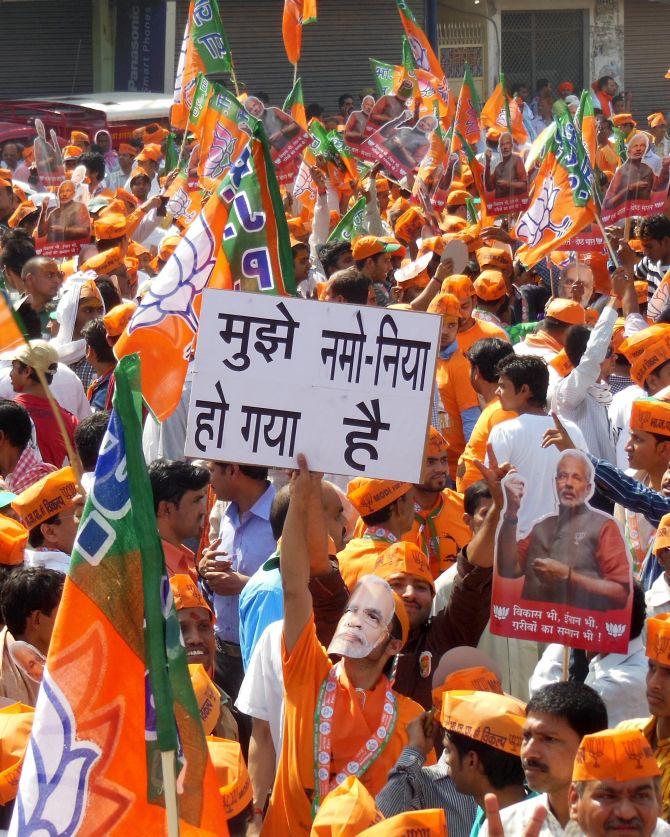
Rediff.com's Sumit Bhattacharya attends Narendra Modi’s rally in the temple city, and finds a people yearning for change, yet torn between affiliations and ambition
At the Jain Ghat in Varanasi on the west bank of the Ganga, boatman Lakshman Sawhney won’t tell you who he will vote for.
How does it matter, he asks, busy drawing his fishing net with his sons, 10-year old Badal and 7-year-old Sahil, whose teeth shine white in contrast to their grime blackened faces, as the waters of the Ganga — which seems filthy enough to give you skin disease if you dip your hand into it — lap around their boat.
But then, this is no ordinary river — neither scientifically, nor spiritually, or politically. The Ganga cleanses organic waste 15 to 25 times faster than any other river in the world. A walk along its banks can fill even the most cynical sceptic with a feeling tough to label with words.
Special Coverage: Election 2014
And for anyone who wants to rule the world’s largest democracy, the banks of the Ganga must approve.
“Divide the Hindus and Muslims,” Sawhney says, voice dripping contempt. “That’s what you want, isn’t it? I will give my vote to whoever gives me money to repair my boat.”
Shamim Kiani, with henna-dyed hair and beard and evidently Muslim, who has come to buy his daily fish from Sawhney, is more Uttar Pradesh-like: Ready to share his politics.
Ajay Rai — Bharatiya Janata Party legislator turned Samajwadi Party leader turned Congress party challenger to Narendra Modi from Varanasi — will get his vote, Kiani declares.
...
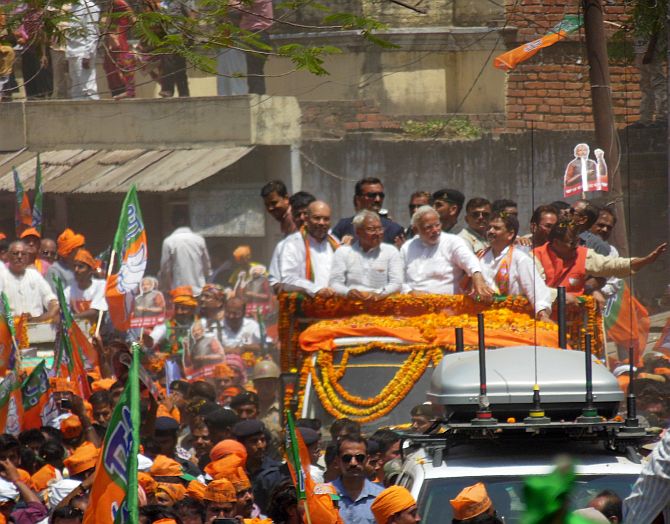
Varanasi’s roughly 280,000 Muslims hold a crucial key to the parliamentary constituency’s ballot box fortunes. If their votes are split, Narendra Modi, the BJP candidate, will romp home in this city of a little more than 1.6 million people.
If they vote as a bloc despite Shia-Sunni divisions, the carnival frenzy of jubilation that Varanasi saw earlier in the day at Modi’s nomination-filing ceremony — that left journalists and the common man grappling for superlatives — could prove premature.
“He is a good man,” Kiani declares about Rai, who is rumoured to fly into a fit of rage befitting his bahubali — that UP-Bihar euphemism for goon — background if anyone throws the rulebook at him at Varanasi airport. “Even if you go to his house at 2 am with your problems, he will listen to you. He has done a lot for Varanasi.”
After Kiani leaves with the fish, Sawhney grins: “He is Muslim, he is just giving you his spiel. I am going to the other side of the river, want to come along?”
The other side is a sandbank. It is evident Sawhney wants to show you something, so you hop onto his boat.
Halfway across the Ganga, he suddenly says, “Hindu will vote for Hindu only, no?”
Aren’t all four prominent Varanasi member of Parliament hopefuls — Modi, Rai, the Aam Aadmi Party’s Arvind Kejriwal and the Samajwadi Party’s Kailash Chaurasia — Hindu?
“I will vote for the new,” Sawhney says, smiling at the mention of Modi. “Give him a chance to rule.”
...
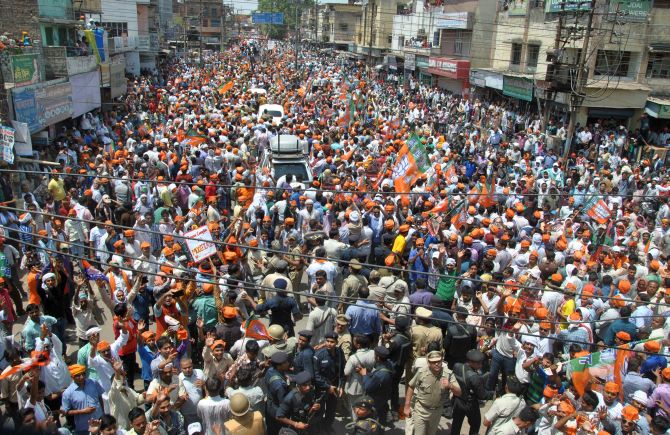
At the sandbank, Sawhney force feeds you cucumbers the size of snakes, and small musk melons, fresh and sweet. A part of the sandbar — that vanishes during the rains when the Ganga puts on weight — has been turned into small farms by Varanasi’s boatmen.
“This is our land,” Sawhney declares. “It has always been. We work six months a year here, backbreaking work, and grow our own food. But they won’t let the poor live. The Forest Department says this land is theirs; that we cannot farm here. That we cannot put up these temporary partitions. If we don’t protect the crop from the waters, nothing will grow here.”
He points to the other side, the Varanasi that has wowed people for thousands of years.
“We have always lived and died on those ghats. Our forefathers ferried Ram, Lakshman and Sita across these waters. But now (since 1985) the government says we cannot grow our own food here. How does it matter who comes to power? Does anyone listen to the poor?”
“Talent and personality,” replies Satya Maharaj, a priest with one of the innumerable temples and religious schools that dot the ghats in Varanasi, when asked about why he considers Narendra Modi a very special leader.
“Daivik shakti hai (It is a god given power),” he adds. “It is god’s mercy. Even children are eager to see Modi. Why? What do they know? It is because he has come to symbolise some feelings. Hope. Ram rajya aise hi ata hai (This is how god’s will comes to earth).”
Is it because Modi’s BJP -- as always -- has promised to build the temple in Ayodhya?
“No,” Maharaj replies emphatically. The small gathering around him agrees. It’s not a temple, but development that is key, they chorus.
...
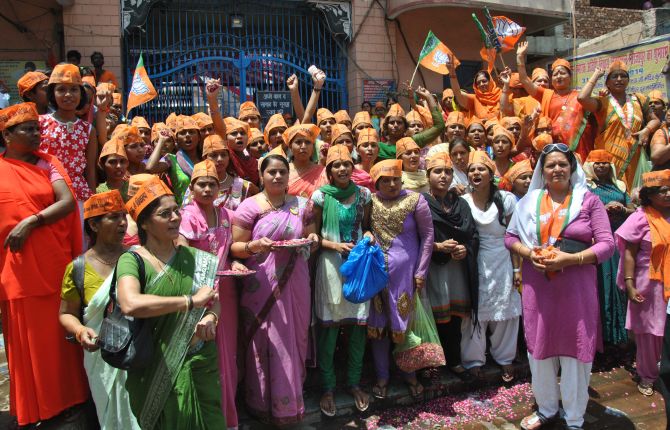
“Even our Muslim brothers will vote for Modi,” Maharaj says. “I speak to them, I know that 10 per cent of Muslims will vote for Modi. People’s feelings have become one with Modi. People are hungry for development. For change.”
Why not Kejriwal, if change is what people want? There is a collective snigger.
“We also thought he is an honest man and we should associate with him,” says another priest. “But then we saw in the media how he lies about how much money he has.”
“The Chinese are giving him money,” pipes in Vivek Shukla, a younger priest. “Modi ayenge toh China ka bhi band bajaenge (If Modi comes to power he will set China straight),” Shukla says.
Like the posters of Sabarmati riverfront and Dwarka temple tourism that you can find across Varanasi, most people you speak to seem to think Gujarat is the promised land of milk and honey.
“I am here for Modi, not BJP,” says Robin Jaiswal, sporting a Narendra Modi cap and Modi t-shirt, who says he is studying chartered accountancy.
He and his friend Anurag Verma, also in Modi cap and t-shirt, are among the thousands of people who have thronged the streets of Varanasi to cheer Modi on as he files his nomination, April 24.
“Because Modi has that potential to bring my country to that level that will affect the whole world, okay? We have all the facilities, all the brains, but the thing is our leaders are doing politics with their vote bank,” Jaiswal says. “They say Modi will benefit the Adanis, Ambanis. I want to ask, when the Adanis and Ambanis set up industries, who will benefit from the jobs generated? Everyone knows Modi’s track record with Gujarat.”
...
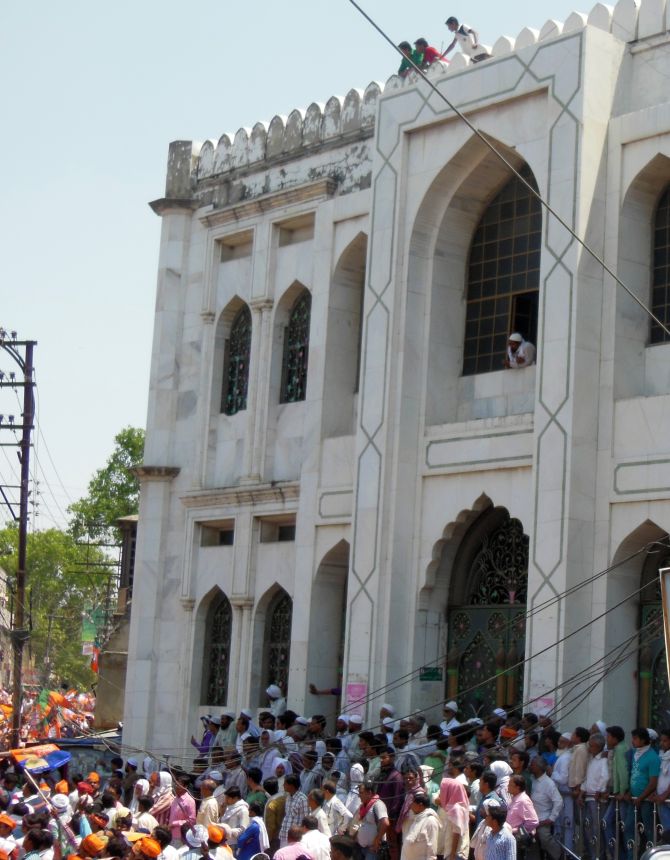
It is an extraordinary spectacle, watching Modi’s march. From the minute his helicopter appears on the sky over the Banaras Hindu University, he is greeted with the kind of cheers you would hear when Sachin Tendulkar walked into Mumbai’s Wankhede stadium, or Sourav Ganguly into Kolkata’s Eden Gardens.
The stream of people crowding every statue garlanding pit-stop Modi is to make in the city has turned into floodwaters straining at the levees.
And as Modi’s procession snakes through Varanasi, it seems all of the city is bathed in saffron and trying to catch a glimpse of Modi.
Mothers cradling snot-nosed toddlers from ramshackle multistorey buildings that look like they might collapse on touch.
Wives with their saris pallus over their heads and held between teeth.
Families crowding balconies of middle-class housing societies, of rich bungalows that would pass off as Bollywood star houses.
From under-construction buildings.
From rooftops.
Everywhere.
Everyone is wearing either a Modi cap, or waving saffron flags, or wearing saffron.
Through streets that have open sewers running by their side — lined with liberal amounts of bleach for Modi’s coming — the mass of saffron accompanies a man who has come to symbolise hate for some, development for others.
In one stretch of the roadshow, the crowd thins a bit. “This is their (Muslim) area,” a local journalist in one of the two media trucks preceding Modi’s tells you.
Even in front of large a mosque, the faithful are out trying to catch a glimpse of the man of the moment. They are not wearing saffron, though, as the very few visible Muslims in the mass of delirious humanity accompanying Modi’s roadshow are.
Everywhere you look, people are showering flowers. Everywhere you look, people are in Modi t-shirts, Modi caps, Modi swashes, Modi saris, waving the exact same cardboard cutout of Modi with his hands pumped into a karate fist position, people smiling, waving saffron flags, dancing, beating all manner of drums, shouting.
“Modi. Modi. Modi. Rozi roti kamana hai, Modiji ko lana hai. Sonia jiski mummy hai, woh sarkar nikammi hai. Har har Modi, ghar ghar Modi. Har har Mahadev. Ab ki bar Modi sarkar.”
...
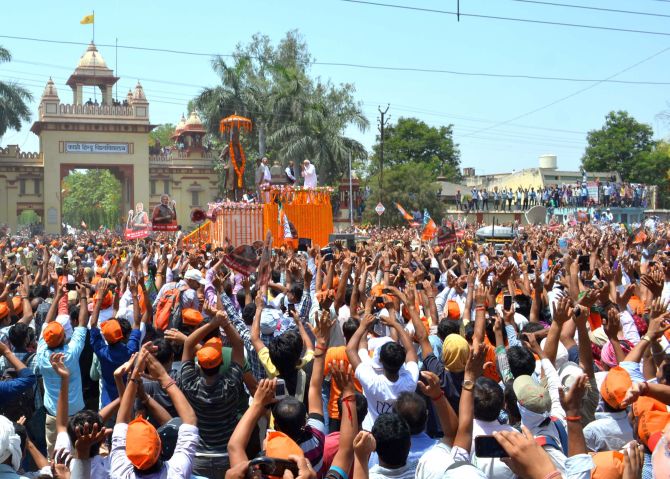
Many have waited for more than 3 hours. It is a sea of saffron, and looks every bit a wave, even if manufactured through mega management (but then, which political rally isn’t?).
It is an impressive show of strength through the streets of Varanasi — where smells of piss, dung, sweat, cheap liquor, paan and flowers mingle.
“Sir, you tell me,” says a driver in Varanasi the day after. “There is so much poverty around, people live from day to day. How can they afford to spend an entire day with any politician? The word is that they were given money, saffron clothes, carted from and back to the outskirts in buses. (An allegation vehemently denied by everyone pro-Modi).”
He agrees that the people are hungry for development. What is development to him? “The poor should get jobs, the hungry should get food, there should be good roads, there should be rule of law, what else, sir,” he asks back.
Who will he vote for? “Our locality people will sit down and decide, three or four days before the elections. There are a lot of Harijans (the term given by Mahatma Gandhi for ‘untouchables’, now Dalits, the lowest rung in the caste hierarchy, who are traditionally not too keen on the BJP ) in our area too. Ajay Rai has a good reputation. If anyone goes to him and says I can’t afford my daughter’s wedding, he gives money from his pocket. He is a religious man, too, his Durga Puja is very famous.”
In this temple city, that seems to matter more than Rai’s criminal past, or his gun-toting bodyguards.
“Modi is a liar,” says Yugal Kishore, businessman cum devotional singer, getting off his scooter to talk to you, a tad disappointed you are not toting a television camera, near the Assi Ghat. “He is not telling people how he gets the money to run his campaign through APCO.”
Is he for Kejriwal?
“He is an honest person. We cannot forget his spark so easily,” Kishore replies, while plugging his album (“Krupa Karo Hanuman, it’s a hit, you can find it on Google”).
“Look at the campaign strategies he initiated, the cap, the uniform, all that you saw in the BJP rally, who started these things? Because of Kejriwal’s curtailing of power tariff in Delhi, power tariff hike in UP and Bihar was halted. He is also short, like most great men are, like Sachin Tendulkar. Mera hi sirf 4 inch zyada ho gaya (I missed greatness by 4 inches).”
...
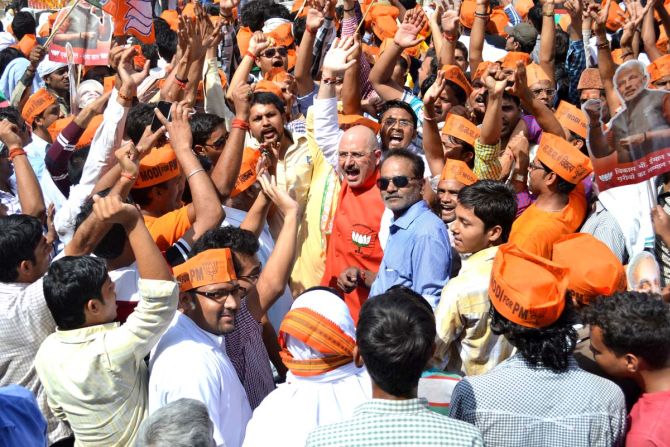
Wit shines through most conversations in Varanasi, even if they are political debates.
“Yes, there were a lot of people at Modi’s rally. I heard even Ram didn’t get this kind of reception when he returned after vanquishing Ravan,” says a Modi detractor in a Varanasi club. “And somebody tell me what is this Gujarat model please.”
“It is better than the Amethi (longtime constituency of Sonia and Rahul Gandhi’s family) model,” quips back a Modi fan. “And who do we vote for then? Ajay Rai? Such a nice and clean man he is, no?”
Detractor shoots back. “Yes, and Amit Shah (Modi’s former Gujarat home minister and present Uttar Pradesh in-charge who is barred from entering Gujarat because of serious charges of extrajudicial killings) is such a nice man too, no?”
“Modi’s rally was just spectacular. I was there too. But I will vote for Kejriwal. He should not feel his voice has been lost,” pipes in a third.
“Arre but tell me, why does Kejriwal lie so much?” shoots back the Modi fan. “He says he doesn’t have more than three shirts. Come on, he was an income tax official, surely he can afford a few more shirts?”
“There will of course be differing views,” says the Kejriwal fan. “But this beating up people if they criticise Modi (the Aam Aadmi Party’s Somnath Bharti was apparently beaten up because he said Modi ke muh pe bhi jhadu lagega, Modi too will get a smack of the broom, the AAP’s election symbol) is it good for democracy?”
Everyone you speak to knows the candidates’ background, traits, even election affidavit declarations. They can give you lessons in contemporary political history. They are politically aware enough to be journalists. Scratch that; they are more politically aware than many journalists.
And yet, in this city where death is supposed to mean salvation from the vicious cycle of life, squalor and poverty — the kind that will make you wince — are everywhere.
One of the many contradictions of Varanasi. One of the many contradictions of Uttar Pradesh, the state that sends the maximum number of lawmakers to Parliament and yet has remained hungry for development.